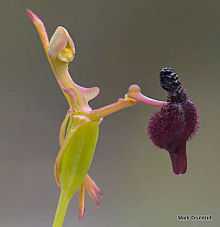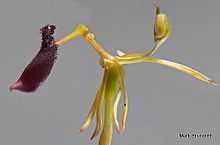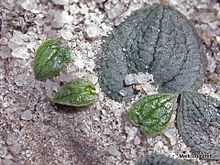Drakaea
| Hammer Orchid | |
|---|---|
 | |
| Hammer Orchid (Drakaea glyptodon), Photograph. | |
| Scientific classification | |
| Kingdom: | Plantae |
| (unranked): | Angiosperms |
| (unranked): | Monocots |
| Order: | Asparagales |
| Family: | Orchidaceae |
| Subfamily: | Orchidoideae |
| Tribe: | Diurideae |
| Subtribe: | Drakaeinae |
| Genus: | Drakaea Lindl. |
Drakaea is an endangered genus of orchid that is native to Australia. Orchids in this genus are commonly called "Hammer Orchids". The common name refers to the shape of the orchid, and the way it moves, resembling a hammer. The genus was named after Miss Drake, a botanical artist who drew orchids and other plants to assist taxonomists in England in the 19th century.
Members of the Drakaea genus are characterized by an insectoid labellum that is attached to a narrow, hinged stem, which holds it aloft. The stem can only hinge backwards, where the broadly winged column carries the pollen and stigma.
Hammer orchids have specified their method of pollination by only being pollinated by the Thynnid wasp. The female wasps being flightless wait on top of stems for the males, to fly in and carry them off. Then they will mate in mid-flight. Hammer orchids, being deceitful, mimic the female wasps; their labellum being similar in color and in structure to the female wasp's abdomen. The orchids also produce pheromones very similar to those that the female wasp produces.The female wasp produces the pheromones to attract the male. This is one of the more notable examples of mimicry in plants. When the male becomes attracted by the pheromones released by the orchid and its shape, it tries to fly away with the labellum, which makes the stem holding it move backwards. Which in turn brings the male wasp's thorax in contact with the sticky pollen packet. The male wasp will become tired of trying and fly off. In order for the Hammer orchid to be successfully pollinated, the male wasp must be fooled by another individual orchid, where it goes through the same procedure. But this time the pollen is deposited in the stigma, and so that plant has been pollinated. This form of symbiosis is not mutualistic, the wasp getting nothing in return for having pollinated the hammer orchid. This method does not always work for the plant's pollination because the male wasp does not always fall for it, especially during mating season when there are more active female wasps.
There are at least ten species in this genus.
List of species
- Drakaea andrewsiae Hopper & A.P.Br., Austral. Syst. Bot. 20: 261 (2007)
- Drakaea concolor Hopper & A.P.Br., Austral. Syst. Bot. 20: 262 (2007)
- Drakaea confluens Hopper & A.P.Br., Austral. Syst. Bot. 20: 264 (2007)
- Drakaea elastica Lindl., Sketch Veg. Swan R.: 56 (1840)
- Drakaea glyptodon Fitzg., Gard. Chron. 1882(1): 494 (1882)
- Drakaea gracilis Hopper & A.P.Br., Austral. Syst. Bot. 20: 271 (2007)
- Drakaea isolata Hopper & A.P.Br., Austral. Syst. Bot. 20: 273 (2007)
- Drakaea livida J.Drumm., London J. Bot. 1: 628 (1842)
- Drakaea micrantha Hopper & A.P.Br., Austral. Syst. Bot. 20: 278 (2007)
- Drakaea thynniphila A.S.George, Nuytsia 5: 60 (1984)


References
External links
| Wikimedia Commons has media related to Drakaea. |
| Wikispecies has information related to: Drakaea |